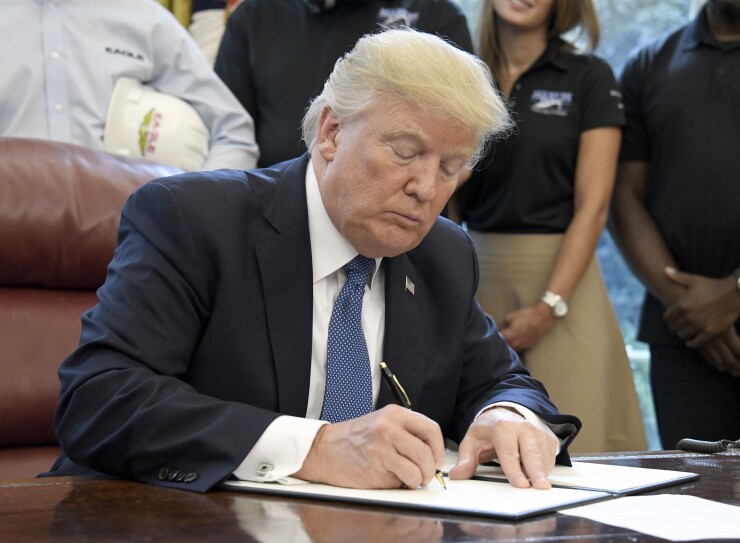(Bloomberg Gadfly) --Despite seven years of alleged prep work and more than seven months of high-pressure effort, destroying the Affordable Care Act was beyond Congress this year.
But President Donald Trump might manage it anyway, with an executive order he could sign this week. Details of the order revealed this weekend are rightfully sending insurers back into a too-familiar spiral of uncertainty.
Even without the order, the Trump administration is already busily kneecapping the ACA. It has waffled on funding subsidies that help low-income Americans afford health care. It has slashed funding that helps promote the ACA. And it has limited the amount of time people have to sign up for insurance in the individual market. All of these efforts will likely suppress enrollment and result in higher insurance premiums.
The proposed executive order may have even more destructive power. It would reportedly seek to exempt "association" health plans -- run by groups of small businesses that buy health insurance together -- from ACA regulations designed to protect people with pre-existing conditions. The order could also let more individuals buy those plans and make it easier to get skimpy short-term insurance to skirt the ACA's penalties for lack of coverage.

This would be disastrous for the individual insurance market. These plans would be able to discriminate against people with pre-existing conditions and offer less-generous coverage than what the ACA requires. Such bare-bones plans would be cheap, attracting young and healthy people to them in droves. That would force insurers to substantially raise premiums for the sicker population still in the ACA's regulated marketplace.
People on the individual market who are too rich to qualify for the ACA's subsidies but too poor to afford rising premiums -- about 7.5 million Americans, according to one estimate -- may be locked out of the market for comprehensive health insurance.
Insurers such as Centene Corp. that have expanded in the individual insurance market could get burned by a sicker, smaller risk pool. Even insurers, such as Anthem Inc. and Molina Healthcare Inc., that have pruned their Obamacare participation back to high-performing states may not be able to avoid the negative consequences. Some insurers that have pulled out of the ACA's exchanges continue to sell individual insurance outside of them.
The fallout wouldn't stop there.
Higher numbers of uninsured or marginally insured Americans would put hospitals on the hook for more uncompensated care. The rise of plans with meager coverage and/or high deductibles would reduce the amount of care people consume. And if the order destabilizes the ACA, then it could spark another effort to pass a comprehensive repeal bill that attempts to cut Medicaid.
Trump might not sign the order; other bombastically announced executive actions have not happened. If such an order is signed, its execution will likely be bogged down in court challenges.
But the mere threat of this order is destabilizing. And the motivation behind it -- to hurt the ACA with any tool available -- should dampen any optimism insurers and investors allowed themselves after congressional Obamacare repeal efforts failed.
This column does not necessarily reflect the opinion of Bloomberg LP and its owners.





